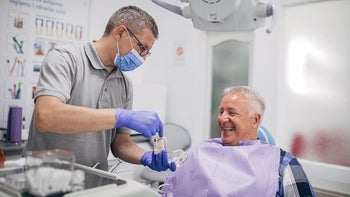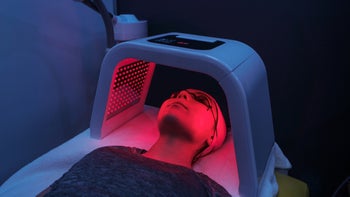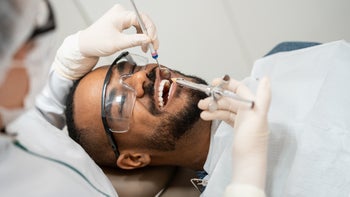
How Much Do Dentures Cost?
Key takeaways:
A full set of permanent dentures can start at $1,000 and go up to $28,000, depending on the denture type, materials used, and other factors.
Dental insurance can make dentures more affordable, but costs can vary by plan.
There are many ways to save on the cost of dentures, such as comparing dental insurance plans and visiting a dental school for services.
Table of contents

More than 36 million Americans have lost all their natural teeth, and roughly 90% of them use dentures. Dentures provide a natural-looking replacement for missing teeth, but they can be costly depending on the type, the materials used, and the dentist’s experience.
If you’re looking for ways to save on dentures, you may want to consider discussing the pros and cons of the different types with your dentist. If you have dental insurance, it may also be helpful to check your coverage details. Below, we discuss these and other strategies for reducing how much dentures cost.
How much do different types of dentures cost?
The type of dentures you choose is one of the most significant factors that can affect the cost.
Search and compare options
Removable dentures are typically more affordable than permanent ones, which have to be removed by a dentist. Full dentures cost more than partials since they replace all of the teeth. Immediate dentures are a temporary, lower-cost option, while implant-supported dentures are designed for long-term use and can cost thousands. Traditional dentures may have a lower upfront cost but require multiple visits, whereas digital dentures offer a precise fit that could save you money over time.
The tables below outline the average costs without insurance for different types of full and partial dentures.
Full dentures
Full dentures are custom-made to fit your mouth, support your facial structure, and restore function to help with activities such as eating and speaking. Here are the three primary types of full dentures and the average cost without insurance.
Type | Cost without insurance |
$1,800 | |
$10,500-$21,500 | |
Immediate | $1,900 |
Partial dentures
Partial dentures typically cost less than full dentures. A partial denture is held together by a framework that keeps it in place next to your natural teeth. Its cost mostly has to do with the framework material. Here are the average costs of partial dentures made from different types of materials without insurance.
Type | Cost without insurance |
Resin base | $1,500 |
Metal cast | $2,000 |
Flexible nylon | $1,700 |
Interim choices | $750 |
What factors can influence the price of dentures?
The cost of dentures can vary widely depending on several factors. Below, we review three key factors that determine cost.
1. Geographic location
Prices for dentures can vary based on a person’s location, with costs generally higher in urban areas and regions with a higher cost of living. For example, according to a 2020 American Dental Association survey, a full set of dentures cost around $2,000 in Oregon but only $1,400 in Tennessee.
2. Dentist’s experience
A prosthodontist is a specialized dentist who often performs denture procedures and typically charges more due to advanced training. According to the American Dental Association, prosthodontists’ fees range from about $1,600 for a partial denture to over $2,700 for full dentures.
3. Materials used
Dentures vary in price based on the materials used to make them, so consider this when making your decision. Common options to discuss with your dentist include:
Acrylic: Acrylic resin is a type of hard plastic that is commonly used for making dentures. Dentures made of acrylic are typically more affordable compared to other options, due to the low-cost of materials and how easy they are to make.
Metal: Dentures made out of metals tend to cost more because they are made from stronger materials like titanium and cobalt chrome.
Porcelain: Dentures made from porcelain allow for more natural-looking teeth. Porcelain dentures cost more than acrylic ones because the material is considered higher quality and they are also usually harder to make.
Nylon: Prices for these dentures can vary depending on the type of nylon and how it’s made, among other factors.
A combination of materials: If acrylic, metal, and other materials are combined for a custom fit, you can expect a higher cost. That’s because the dentures are created specifically for your mouth.
Ways to save on dentures: From purchasing a dental insurance plan to visiting a dental school for services, here are some ways to save on dental care.
Do you have a health savings account (HSA) or flexible spending account (FSA)? You may be able to use your tax-advantaged account to pay for dentures.
Tips for taking care of your new dentures: A cleaning routine can extend the life of your new artificial teeth, but so can taking these other denture care steps.
What additional costs can you expect when getting dentures?
Beyond the cost of dentures, there are other related expenses that can add up. Oral exams, tooth extractions, dental implants, and adjustments can all contribute to your bottom line. Here are common denture-related procedures and services and their average costs:
Oral exams: Before you get dentures, your dentist will most likely want to check the health of your mouth and gums. On average, oral exams cost about $75-$100 or more.
Tooth extraction: Your dentist may extract, or pull, teeth to prepare your mouth for dentures. For each extraction, you can expect to pay about $300.
Anesthesia: If you need to get teeth pulled to prepare your mouth for dentures, you will need anesthesia. Local anesthesia given by injection is usually included in the price of extraction. If you need general anesthesia, you could pay $250 for the first hour and then $200 for each additional 15 minutes.
Panoramic X-ray: This type of X-ray takes a full picture of your jaw from right to left. A panoramic X-ray can cost about $130.
Tissue conditioning: If your gums are damaged from having teeth pulled or loose-fitting dentures, you may need tissue conditioning. This process involves your dentist attaching a soft lining to your dentures every 2-3 weeks until your gums are healthy and healed. The average cost is $190.
Denture adjustments: Over time, your dentures may need adjusting to fit properly. This service may be included in your original denture cost. If not, expect to pay about $100 for each adjustment.
Denture relining: When the base of a denture needs to be reshaped for a better fit, this is called a relining. On average, a chairside relining (at a dentist’s office) costs about $350 or more, depending on the type of denture. A laboratory relining can cost nearly $500. There are also at-home denture relining kits available for $10-$50.
Does insurance cover dentures?
Dentures are usually covered by private dental insurance, but the exact benefits vary by plan. Many plans pay 50% of the cost, up to the annual coverage maximum — minus any deductibles. Here’s how some different types of insurance cover dental care and dentures:
Marketplace health plans: Under the Affordable Care Act, marketplace plans are not required to offer adult dental coverage. But you can buy a separate dental plan that offers coverage for dentures.
Medicare: Original Medicare (Parts A and B) typically does not cover dentures. However, Medicare Advantage (Part C) plans may include limited denture coverage, often for replacing dentures every 5 years.
Medicaid: Medicaid coverage for dentures varies by state. Currently, more than half of U.S. states cover partial or full dentures, though some limit coverage to one set per lifetime, while others, like New York, allow replacements every 8 years.
Read more like this
Explore these related articles, suggested for readers like you.
If you can’t find dental insurance that meets your needs, consider a dental savings plan. You may be able to find a plan that offers you a discount on major services, such as dentures. If you have a tax-advantaged account, like a health savings account (HSA) or flexible spending account (FSA), you can also use those funds to pay for dentures.
Where can you get free or low-cost dentures?
If you’re looking for help paying for your dentures, here are some resources that help people access free or low-cost dental care:
Older adults, people with disabilities, and members of other groups may be able to get free dentures through programs like:
Give Back a Smile, a program for domestic violence and sexual violence survivors
Dental Lifeline Network, which serves disabled, older, or medically fragile people
You may also want to consider looking for dental clinics or applying for a dental grant, which may help you save on out-of-pocket costs for dentures and other associated expenses. Check with your local college, dental school, or dentist’s office for more information.
How long do dentures last?
Dentures can last for years if properly cared for and cleaned daily. On average, full dentures last about 10 years. Partial dentures typically last at least 5 years.
Implant-supported dentures are attached to the mouth through dental implants. Some are considered permanent dentures, although they may need replacing after 10 to 15 years. In the meantime, a prosthodontist can remove and repair the dentures if they break or stain.
Factors that can influence the longevity of your dentures include:
Your diet
How well you take care of your prosthesis
Weight loss or gain
Visiting your dentist every 6 months so they can evaluate the health of your tissues and the fit of your dentures is also recommended.
Are there alternatives to dentures you should consider?
Removable dentures offer a cost-effective way to fill in missing teeth. You can expect to pay more for more permanent solutions, including:
Dental bridge: A dental bridge can cost up to $2,500 for one missing tooth.
Dental implants: Dental implants cost between $3,000-$7,000 for a single tooth implant
Are dentures worth the cost?
Dentures have pros and cons, so whether the cost is worth it to you depends on your needs and lifestyle. Here are some things to consider when deciding whether to get dentures.
On the plus side, dentures:
Make it easier to speak and eat, if properly fitted
Help maintain face and jawline shape
Provide a custom fit
Look natural
Are more affordable than other options
May improve quality of life and restore confidence
On the downside, dentures:
Require more care than implants
Add extra steps to your oral hygiene routine
May require reapplying denture adhesive throughout the day
Require regular checkups to adjust the fit
May need replacing after about 10 years, depending on the type
Can make it hard to eat comfortably or speak clearly, if poorly fitted
The bottom line
The cost of dentures can vary widely based on several factors, including the materials you choose, the type of dentures you need, and any additional services that are required. On average, traditional full dentures cost around $1,800, while implant-supported dentures can cost over $10,000 without insurance.
To reduce your out-of-pocket costs, you can shop around, explore dental insurance plans, and consider using a tax-advantaged health account to pay for your dentures. You can also look into getting discounted care at dental schools or clinics.
Why trust our experts?



References
ADA Center for Professional Success. (2020). Dental fees: Results from the 2020 survey of dental fees. American Dental Association.
American College of Prosthodontists. (n.d.). Dentures FAQs.
American College of Prosthodontists. (n.d.). Relined dentures.
American Dental Association. (2023). Dental care and maintenance.
Dinkel, D. (2023). What are the flexible partial dentures? Authority Dental.
Faizullabhoy, M., et al. (2024). Dentures market, by denture type (complete, partial), material (acrylic, metal, ceramic), manufacturing process (conventional, 3D printed), usage (removable, fixed), end-use (hospitals, dental clinics) – Global forecast (2024 – 2032). Global Market Insights.
Freed, M., et al. (2021). Medicare and dental coverage: A closer look. KFF.
Harchandani, N., et al. (2025). How much do dentures cost in 2025? Authority Dental.
Hattaway, R., et al. (2024). What are the all on 4 dental implants? Authority Dental.
Hattaway, R., et al. (2025). How much do dental implants cost in 2025? Authority Dental.
HealthCare.gov. (n.d.). Dental coverage in the marketplace.
Introspective Market Research. (2024). Dentures market expected to reach USD 4.34 billion by 2032, with a CAGR of 6.61%. GlobeNewswire.
Khangura, S. D., et al. (2023). Longevity and partial complete dentures. CADTH Health Technology Review.
Medicaid and CHIP Payment and Access Commission. (2021). Medicaid coverage of adult dental services.
Penn Dental Medicine. (2023). How to get affordable dental implants with dental implant grants. University of Pennsylvania.
Taylor, M., et al. (2021). Longevity of complete dentures: A systematic review and meta-analysis. The Journal of Prosthetic Dentistry.
The Legal Aid Society. (n.d.). What you need to know about the expansion of Medicaid dental coverage in NYS.





























